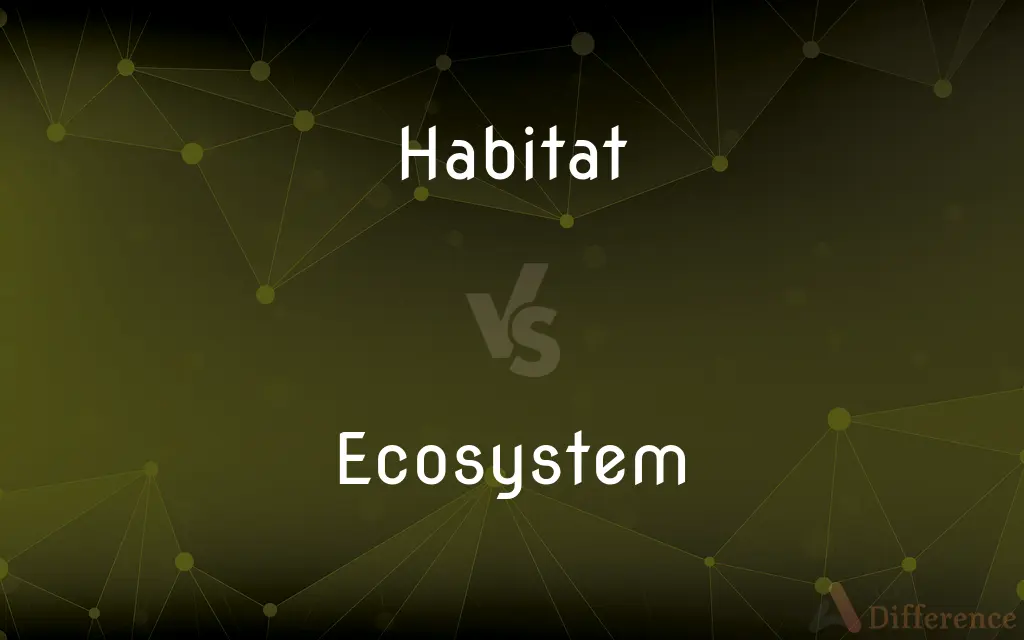Habitat vs. Ecosystem — What's the Difference?
Edited by Tayyaba Rehman — By Urooj Arif — Updated on March 16, 2024
A habitat is the specific area where a species lives, focusing on its physical environment; an ecosystem encompasses both living organisms and their physical environment, highlighting interactions.

Difference Between Habitat and Ecosystem
Table of Contents
ADVERTISEMENT
Key Differences
A habitat refers to the specific location or environment where a particular species lives and grows. It is defined by the physical attributes like climate, soil type, and availability of water. Whereas, an ecosystem includes not only the physical environment but also the living organisms that inhabit it, emphasizing the interactions among these organisms and their environment.
In a habitat, the main focus is on providing the right conditions for a species' survival and reproduction. This includes aspects like temperature range, food sources, and shelter. On the other hand, an ecosystem looks at a broader picture, including how different species within the same habitat interact with each other and with their non-living environment.
Habitats can be seen as components of an ecosystem. A single ecosystem can contain multiple habitats, each catering to the needs of different species. Whereas an ecosystem integrates these habitats, focusing on energy flow, nutrient cycles, and population dynamics across them.
The conservation of a habitat is crucial for the survival of a specific species, emphasizing the protection of its living conditions. In contrast, ecosystem conservation is about maintaining the balance of all interactions within, aiming for biodiversity and the health of the environment as a whole.
While habitat destruction directly affects the species living in it, leading to potential endangerment or extinction, ecosystem disruption can have broader, more complex impacts, including the breakdown of ecological processes and services critical for multiple species, including humans.
ADVERTISEMENT
Comparison Chart
Definition
The specific area or environment where a species lives.
A community of living organisms and their physical environment interacting as a system.
Focus
Physical conditions suitable for a species' life.
Interactions among organisms and between organisms and their environment.
Components
Climate, soil, water availability.
Living organisms (biotic) and non-living elements (abiotic).
Scale
Generally smaller, can be part of an ecosystem.
Larger, encompasses multiple habitats.
Conservation
Aimed at protecting the living conditions of specific species.
Aimed at maintaining biodiversity and ecological processes.
Compare with Definitions
Habitat
They vary greatly in size and conditions, depending on the needs of the species.
Desert habitats are characterized by extreme temperatures and minimal water.
Ecosystem
An ecosystem is a complex network of living organisms and their physical environment.
Forest ecosystems are crucial for global oxygen production.
Habitat
It focuses on the physical environment specific to species.
Polar bears thrive in the icy habitat of the Arctic.
Ecosystem
Ecosystems are characterized by energy flows and nutrient cycles.
Decomposers play a vital role in nutrient cycling within ecosystems.
Habitat
Habitats are crucial for the survival and reproduction of species.
Deforestation threatens the habitat of many terrestrial animals.
Ecosystem
They can vary from very small to global in scale.
A pond ecosystem is an example of a small-scale ecosystem.
Habitat
Conservation efforts often focus on protecting habitats from destruction.
Wetland habitats are protected to preserve their unique biodiversity.
Ecosystem
It includes interactions among organisms and between organisms and their environment.
Predator-prey relationships are key dynamics in many ecosystems.
Habitat
A habitat is an area that provides all the necessary conditions for a species to live.
The coral reef habitat is home to a diverse range of marine life.
Ecosystem
Conservation of ecosystems focuses on maintaining balance and diversity.
Protecting ecosystems like rainforests helps combat climate change.
Habitat
In ecology, the term habitat summarises the array of resources, physical and biotic factors that are present in an area, such as to support the survival and reproduction of a particular species. A species habitat can be seen as the physical manifestation of its ecological niche.
Ecosystem
An ecosystem (or ecological system) consists of all the organisms and the physical environment with which they interact. These biotic and abiotic components are linked together through nutrient cycles and energy flows.
Habitat
The natural environment in which a species or group of species lives
Good coyote habitat.
Managing wildlife habitat.
Ecosystem
An ecological community together with its environment, functioning as a unit.
Habitat
A particular kind of natural environment
Woodland and prairie habitats.
Ecosystem
A system formed by an ecological community and its environment that functions as a unit.
Habitat
An artificial environment created for an animal to live in
The lion habitat at the zoo.
Ecosystem
The interconnectedness of organisms (plants, animals, microbes) with each other and their environment.
Habitat
A structure that affords a controlled environment for living in extremely inhospitable locations, such as an underwater research laboratory.
Ecosystem
(by extension) A network of interconnected people or organisations that resembles a natural ecosystem due to the complex interdependencies.
The company’s ecosystem mainly comprises its supply chain, customers, end consumers and competitors.
Habitat
The place where a person lives or is most likely to be found
"This park became his habitat—a bench-sitter at 17" (Neal Cassady).
Ecosystem
A system formed by the interaction of a community of organisms with their physical environment
Habitat
Conditions suitable for an organism or population of organisms to live.
This park offers important amphibian habitat and breeding area.
Habitat
A place or type of site where an organism or population naturally occurs.
Habitat
A terrestrial or aquatic area distinguished by geographic, abiotic and biotic features, whether entirely natural or semi-natural.
Habitat
A place in which a person lives.
Habitat
The natural abode, locality or region of an animal or plant.
Habitat
Place where anything is commonly found.
This word has its habitat in Oxfordshire.
Habitat
The type of environment in which an organism or group normally lives or occurs;
A marine habitat
He felt safe on his home grounds
Common Curiosities
How does a habitat differ from an ecosystem?
A habitat is specific to one species and its living conditions, while an ecosystem includes multiple species and their interactions within a physical environment.
What is a habitat?
A habitat is the natural environment where a specific species lives and thrives.
Can an ecosystem have multiple habitats?
Yes, ecosystems can encompass multiple different habitats, each supporting different species.
Why is habitat conservation important?
Habitat conservation is crucial for the survival of specific species and maintaining biodiversity.
What measures can help protect habitats and ecosystems?
Protecting natural areas, restoring damaged environments, and sustainable resource use can help conserve habitats and ecosystems.
How can ecosystems affect global health?
Healthy ecosystems contribute to clean air, water, and soil, directly impacting global health and well-being.
What is an ecosystem?
An ecosystem comprises both the biotic (living) and abiotic (non-living) components interacting in a specific area.
What is biodiversity, and how is it related to ecosystems?
Biodiversity refers to the variety of life in a particular habitat or ecosystem, crucial for ecological stability and resilience.
How do human activities impact habitats and ecosystems?
Human activities, like deforestation and pollution, can destroy habitats and disrupt ecosystems, leading to loss of species and ecological imbalance.
What role do ecosystems play in the environment?
Ecosystems regulate natural processes, including climate, water filtration, and carbon cycling, essential for life on Earth.
What is the significance of energy flow in an ecosystem?
Energy flow through food chains and webs is fundamental for the survival of organisms and the functioning of ecosystems.
What is the impact of habitat loss on biodiversity?
Habitat loss can lead to reduced biodiversity, endangering species and disrupting ecological processes.
How do climate conditions affect a habitat?
Climate conditions define the types of species that can survive in a habitat by influencing the habitat's physical characteristics.
Can a species belong to more than one habitat?
Yes, some species can adapt to live in multiple habitats, although most have a primary habitat.
What are some examples of human-made ecosystems?
Urban parks, gardens, and agricultural fields are examples of human-made ecosystems designed to mimic natural processes.
Share Your Discovery

Previous Comparison
Inform vs. Notify
Next Comparison
Can vs. CouldAuthor Spotlight
Written by
Urooj ArifUrooj is a skilled content writer at Ask Difference, known for her exceptional ability to simplify complex topics into engaging and informative content. With a passion for research and a flair for clear, concise writing, she consistently delivers articles that resonate with our diverse audience.
Edited by
Tayyaba RehmanTayyaba Rehman is a distinguished writer, currently serving as a primary contributor to askdifference.com. As a researcher in semantics and etymology, Tayyaba's passion for the complexity of languages and their distinctions has found a perfect home on the platform. Tayyaba delves into the intricacies of language, distinguishing between commonly confused words and phrases, thereby providing clarity for readers worldwide.













































